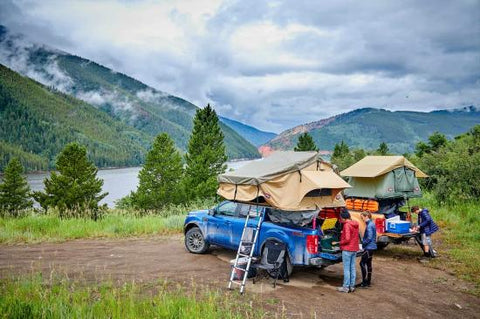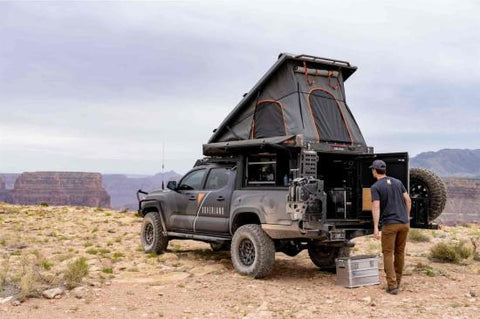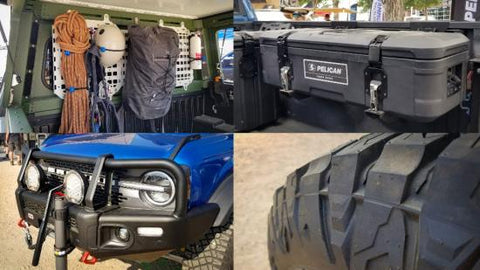
Pro Guide 2023: How to Plan Your First Overland Camping
Share
Overland camping is a form of adventure tourism. It involves travelling to remote areas of the world in an overland vehicle, usually with other people who are also camping. The aim is to camp out under the stars and enjoy nature as much as possible. In this article, we'll help you with everything you need to know about overlanding—how to get started and all the overlanding essentials necessary for your adventurous expedition!

What is overland camping?
We all know that overland camping is an amazing experience. However, overlanding meaning can vary for different people. For some, it means driving thousands of miles in a day. For others, it means hitting every campsite on their way to the final destination. Other types of overlanders are those who take months-long trips with their families or friends and don't leave any place behind.
Indeed, overland camping can take many forms, but it most often involves driving from one destination to another via dirt roads and wilderness trails instead of highways or main roads. Overlanding is a great way to see new places, meet new people and learn about cultures you've never seen before.

How to start your overlanding trip?
Overland camping is a great way to see the world, but it can be intimidating to start your first trip. Well, worry no more as we've listed down some steps that every beginner should do before they leave for their overlanding trip.
Do some research
Before you go, you'll want to do some research. It can help you find overland camping gear and learn about the perfect type of vehicle for such activity. Moreover, it can help you know the weather conditions along your intended route, so you can prepare accordingly. All of this research is a great way to start your planning process!
Here are some resources you may want to check out:
- Search Engines– Search engines are your friend, and it's free! Use search engines like Google, Bing, or Safari to find answers about overland camping (or anything else).
- Online Forums– Forums are a great place to start if you're researching overland camping. They can help you get an idea of what's out there and what's available, and they're also an excellent place to find people who have gone overlanding before, so they can give you advice based on their own experiences.
Prepare your vehicle
Before you take off on your journey, you'll want to ensure your vehicle is in good working condition. This is especially important if it's a new vehicle or one that hasn't been used for some time. You can check the following things:
- Oil & Coolant Levels: One of the most important things to do is check the oil and coolant levels. Low levels could lead to damage that makes your car unsafe for driving or even worse.
- Tire Pressure:Check the tire pressure of all four wheels, as well as that of your spare. Make sure they're properly inflated and have no leaks. If they have any issues, get them fixed before hitting the road!
- Fuel:Check that you have enough fuel in case of emergencies—it's better to have too much than not enough when driving through remote areas where gas stations may not be nearby.
Plan for every situation
Finally, plan ahead and ensure everything is organized and goes smoothly! Remember that you can't plan for every situation. But you can come up with plans for the most likely scenarios and then have backups for those.
Here are the common ones:
- Have a backup plan if you get stuck in the mud or sand.
- Have a backup plan if someone gets injured (e.g., heat exhaustion and other medical problem) on the trail or in camp.
- Have a backup plan if one of your vehicles breaks down during travel or at camp (e.g., if you run out of fuel).
- Have a plan prepared for extreme weather conditions or a natural disaster.
Overlanding essentials
Here are the top 8 useful essentials for your overland camping:
- First Aid Kit:You should always carry an emergency kit in case something goes wrong during overland camping. Be sure that whatever kit you buy contains all the essentials (tape for cuts and scrapes, bandages for sprains, and antihistamines like Benadryl for allergic reactions).
- Quality Tent:A quality tent is the best overlanding gear. Ensure enough room is inside, especially if two people share the tent. If possible, get one with two doors, so everyone has their own entrance/exit point—this makes getting into bed at night easier when other people are already inside.
- Sleeping Pad:This is especially needed if you're going overland camping during the spring or fall, as it might get chilly at night. You'll be much more comfortable with a little padding between your body and the ground.
- Camping Chair:If you're going with a group of people, a camping chair will make it easier for everyone to sit around the fire pit or picnic table.
- Camp Stove:This is optional but definitely worth bringing along if you want to avoid cooking over an open fire.
- Water Bottle:To avoid thirst, bring a reusable water bottle to fill with fresh drinking water from your water tank or nearby streams or ponds.
- A Good Knife:There are many types of knives out there, but you may specifically get a carbon steel blade with a comfortable handle. You'll be using this overland gear/tool for everything from cutting rope to slicing fruit, so you want it to feel good in your hand and functional.
-
Solar Generator:It's important to have a solar generator when you're camping as it will allow you to charge your electronic devices without relying on an external power source. Thus, the Anker Solar Generator 767 is the perfect addition to your overlanding essentials. It's IP67 waterproof and has 3-mode angle adjustments so that you can seamlessly adjust it to either 40°, 50°, or 60° via the adjustable kickstand for optimal solar power. It has a 2400W capacity and can power up to 12 Devices.

Conclusion
Now that you know what is overlanding, it's time to get out there and explore. It's a great way to escape the busy world and reconnect with nature. You don't need much more than your vehicle and some camping essentials/gear to plan your first trip. We hope this article helped you with everything you need to know.
FAQ about Overland Camping
Here's the list of the most frequently asked questions about overland camping.
How much does an overland trip cost?
The cost of an overland trip depends on the length of your journey and whether you're traveling with a group or by yourself. But on average, anywhere between $20 and $100 is the expected pay for each person per day for an overland trip.
How many miles a day overlanding?
Depending on your skill level, the type of vehicle you're driving, and the terrain you're navigating, a reasonable range for your daily mileage can be anywhere from 50 to 200 miles. Your mileage will vary depending on these factors, but it's always better to plan for more than less.
How do I find an overlanding campsite?
First, find a map of the area in which you want to go camping. Then, look for places that have a lot of campsites and amenities. These might include things like bathrooms, showers, and laundry facilities. You can also look for maps showing trails near your campsite—this will help you plan your trip and ensure enough space for everyone to walk around comfortably.